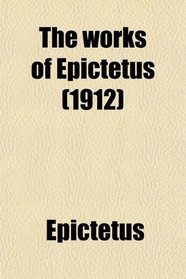Search -
The works of Epictetus (1912)
The works of Epictetus - 1912
Author:
Purchase of this book includes free trial access to www.million-books.com where you can read more than a million books for free. This is an OCR edition with typos. Excerpt from book: THE DISCOURSES OF EPICTETUS. BOOK I. CHAPTER I. OF THE THINGS WHICH ARE, AND THE THINGS WHICH ARE NOT IN OUR OWN POWER. OF human faculties in general... more »
Author:
Purchase of this book includes free trial access to www.million-books.com where you can read more than a million books for free. This is an OCR edition with typos. Excerpt from book: THE DISCOURSES OF EPICTETUS. BOOK I. CHAPTER I. OF THE THINGS WHICH ARE, AND THE THINGS WHICH ARE NOT IN OUR OWN POWER. OF human faculties in general... more »
ISBN-13: 9780217641654
ISBN-10: 0217641652
Publication Date: 8/16/2009
Pages: 244
Rating: ?
ISBN-10: 0217641652
Publication Date: 8/16/2009
Pages: 244
Rating: ?
0 stars, based on 0 rating




